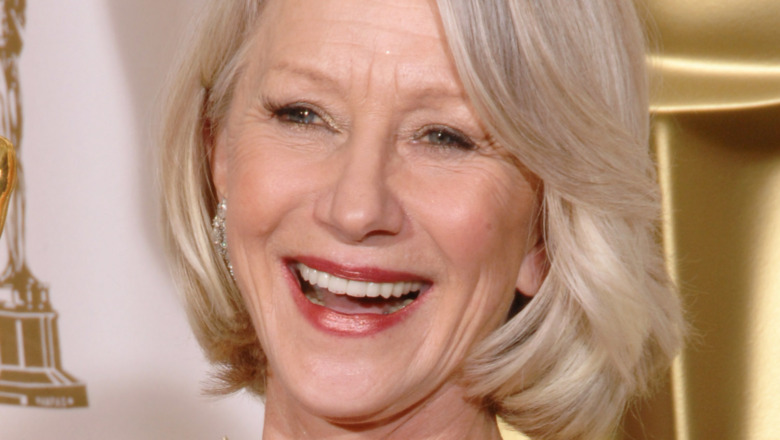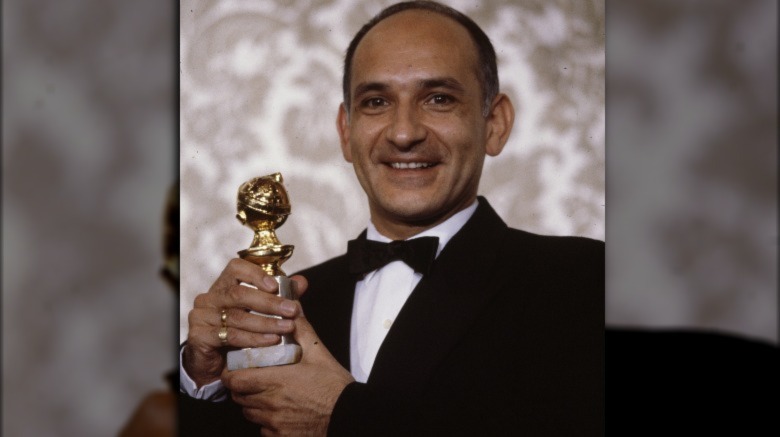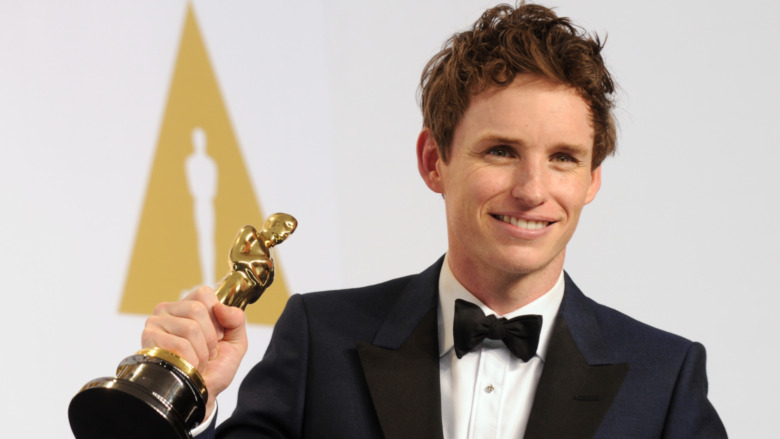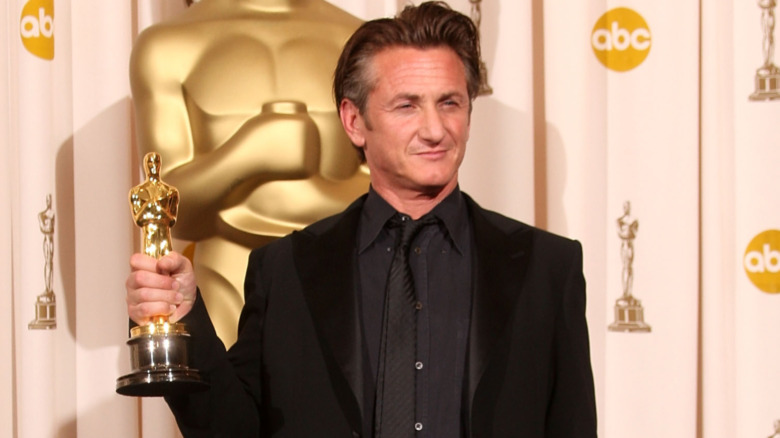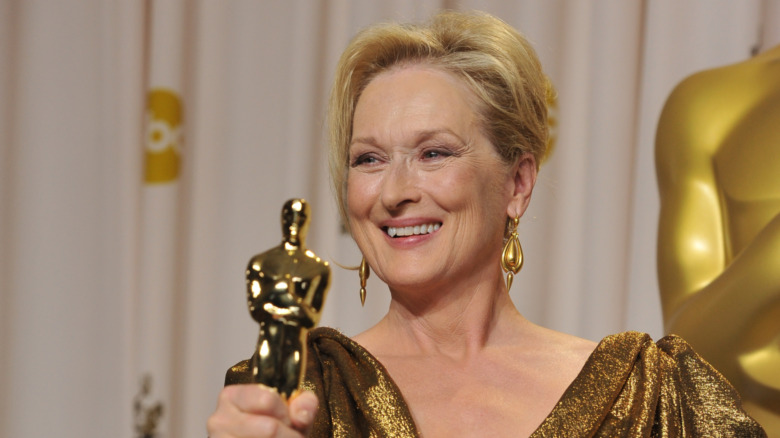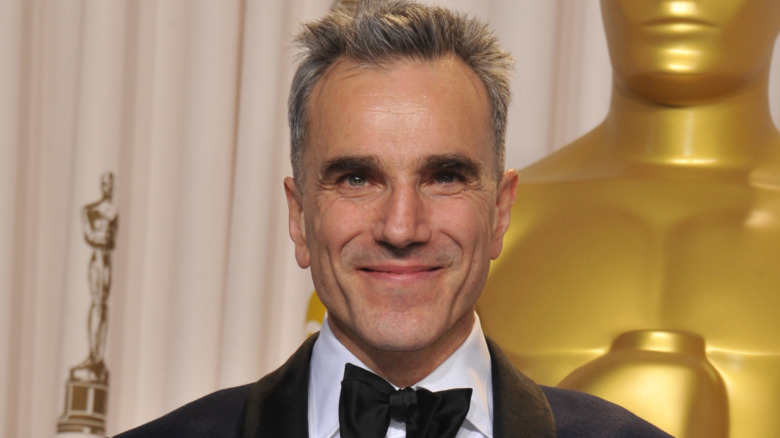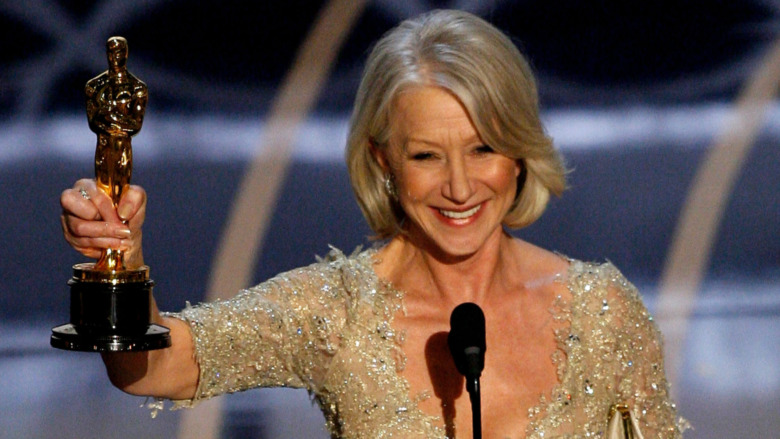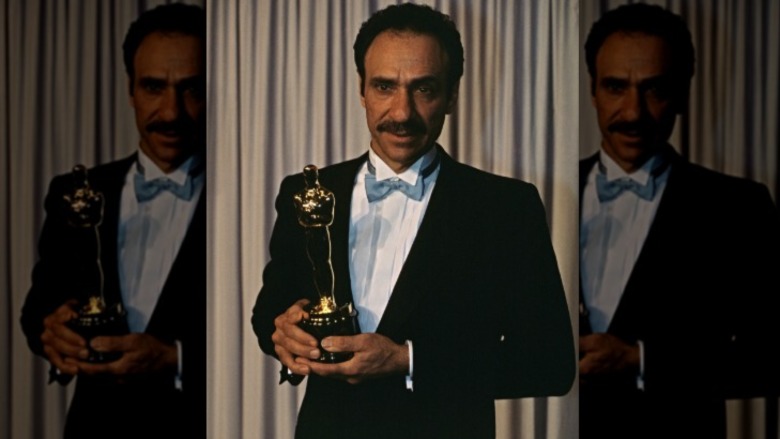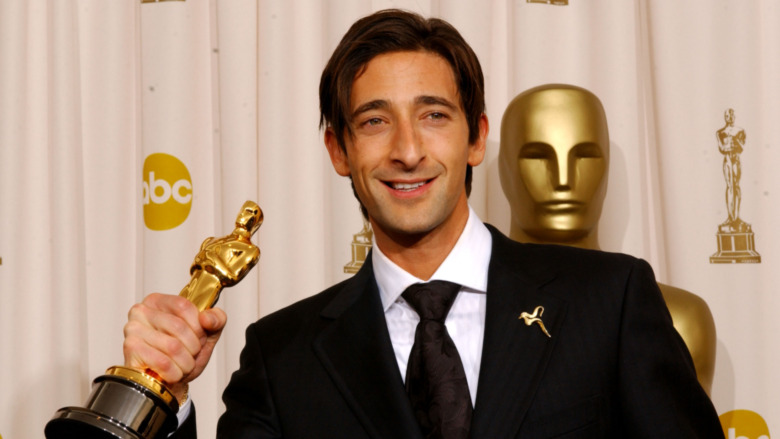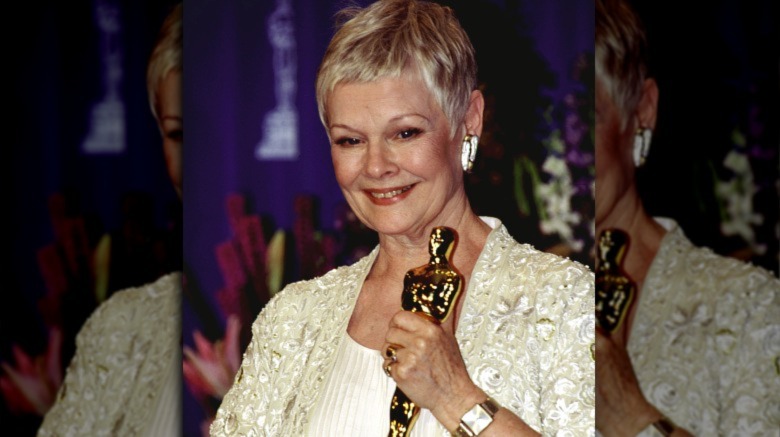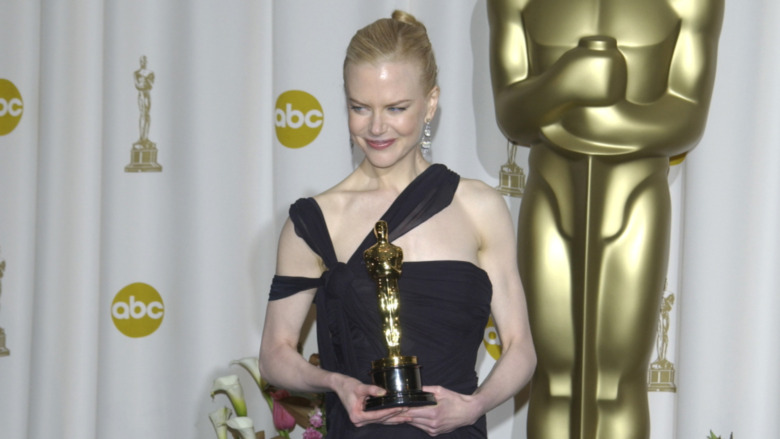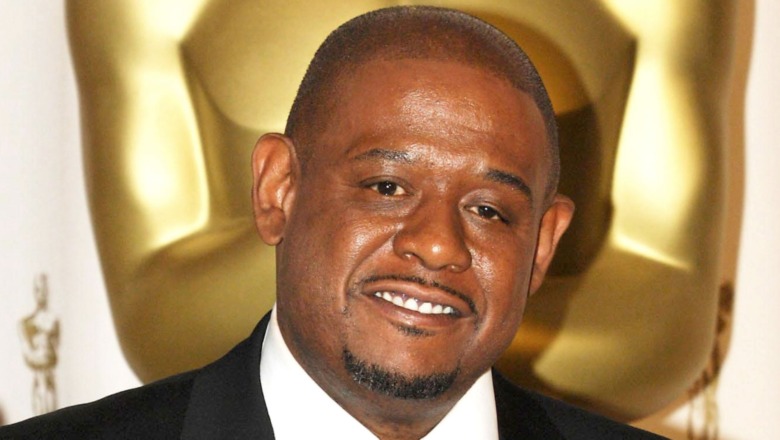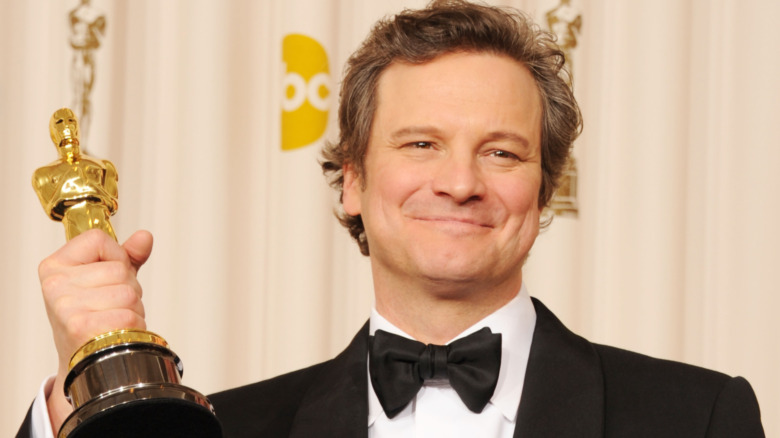Celebs Who Took Home Best Actor Awards For Their Portrayal Of Historical Figures
Actors have gone to great lengths to portray characters in their films. When playing Ray Charles in the movie Ray, for example, Jamie Foxx wore prosthetic eyelids, and understandably, that took a lot of getting used to. ("Imagine having your eyes glued shut for 14 hours a day," Foxx said in The New York Times.) When actor Anne Hathaway starred as Fantine in Les Misérables, she went as far as losing 25 pounds and, as she told Vanity Fair, cut herself off from loved ones to get into the character's frame of mind. Both of these actors' hard work and brilliant performances resulted in Oscar wins.
A lot of work goes into an Academy Award-worthy performance, and it goes without saying that a lot of pressure goes into playing a real life, historical figure in a movie. From portraying royalty, U.S. presidents, and social activists, these actors below read biographies, watched old newsreels to copy their exact mannerisms, and even trained their voices to sound just like the historic people they played. Needless to say, the actors did a lot more than read the scripts when it came time to make the movies, and their dedication had them going home with arguably the most prestigious acting award out there: the Oscar.
Ben Kingsley won playing the 'impossible' role of Mahatma Gandhi
Sir Ben Kingsley, who was born Krishna Bhanji, took on his first major film role when he was cast to portray Indian lawyer, social activist, and as the people called him, the father of India. In Richard Attenborough's 1982 film Gandhi, based on the biography by journalist Louis Fletcher, Kingsley was brought on to play Mahatma Gandhi. Kingsley, who had done mostly theater work and television series for the BBC, admitted at a USC School of Dramatic Arts event in 2018 that he believed the role would be "impossible" to play after watching hours of news footage of the Indian leader. The chance to portray Gandhi, who successfully led the nationalist movement to gain independence from British rule of India, was an intimidating role, but Kingsley took on the part. According to The New York Times, the actor prepared for his role by reading biographies, changing his diet, taking up meditation, and shaving his head.
"When I have totally immersed myself in the mechanical, logical preparation of a part, if I and my craft are totally bonded and fully exploited, something else in me is awakened and begins to inform my work," Kingsley said in The New York Times. His efforts earned him a nomination at the 55th Academy Awards for Best Actor, which he went on to win in 1983. He also earned two Golden Globes and two BAFTAs for his performance.
Stephen Hawking was wowed by Eddie Redmayne's Oscar-winning performance
In his first leading role, British actor Eddie Redmayne was cast as the brilliant scientist Stephen Hawking in director James Marsh's 2014 film The Theory of Everything. It was a role that took hold of the actor both mentally and physically as he prepared to portray Hawking from his very beginnings as an astrophysics student at the University of Cambridge to when he learned he had the motor neuron disease ALS, which eventually leaves him unable to walk or speak. For over a half a century, Hawking lived with the disease, beating tremendous odds; studies show only 10% of people live over 10 years after they are diagnosed with ALS.
Redmayne told The Guardian that one of the most challenging parts of the film was towards Hawking's later stages in life when he had to learn how to control his face. "The ironic complication was that when Stephen was stillest, it was most energy-consuming for me. His face cannot move but that didn't mean I could relax mine... I worked on getting into extremes of physicality and then trying to relax," he shared. Redmayne even had the chance to meet Hawking after filming, with Variety reporting that the theoretical physicist had a nurse wipe a tear from his eye. Marsh told the outlet, "[Hawking] emailed us and said there were certain points when he thought he was watching himself." Redmayne's performance won him the Academy Award for Best Actor in 2015.
Sean Penn earned the gold for his portrayal of Harvey Milk
In Gus Van Sant's 2008 film Milk, actor Sean Penn masterfully portrayed the nation's first openly gay man elected to public office, Harvey Milk. As the Los Angeles Times noted, Penn not only looked like the gay rights activist, but he took on his passion for equality. Milk's friend and fellow activist Cleve Jones told the outlet, "It was eerie and wonderful and at times just incredibly sad." Milk was shot to death in 1978 at San Francisco City Hall by Dan White, who disagreed with Milk and his stance for LGBTQ issues.
The New York Times praised Penn's acting skills, stating, "Mr. Penn, an actor of unmatched emotional intensity and physical discipline, outdoes himself here, playing a character different from any he has portrayed before." Dan Jinks, who produced the movie went on to share, "What we've heard from people is, you forget you're watching Sean Penn" (via The Los Angeles Times). His dedication to the role earned Penn a nomination for Best Actor at the 2009 Academy Awards, and he won the award and used his time on the stage to defend same-sex couples' right to get married.
Meryl Streep played the Iron Lady, won the golden man
After she portrayed Margaret Thatcher in the 2011 film The Iron Lady, Meryl Streep said she found respect for the former prime minister of the United Kingdom and leader of the Conservative Party. Streep, who is a proud Democrat, told Radio Times (via The Guardian) that it was "extraordinary" to see a woman reach such a position of power, politics aside.
The polarizing political figure, who was prime minister from 1979 to 1990, had a distinct way of speaking, and Streep went all in on embodying the British leader. "There were also things like how she held herself, how she stood and how she sat, how she crossed her legs and what jewelry she wore, how she set her head when she was making a point – all of those things were important," Streep told Radio Times (via The Guardian). "And they were specific to her, so I did try to capture that to a certain degree because it had a lot to do with how people reacted to her. It was her armor."
At the 2012 Oscars, Streep won the Academy Award for Best Actress for The Iron Lady, which became her third Oscar win. In that same category, she won for the 1982 film Sophie's Choice, and she nabbed Best Supporting Actress for 1979's Kramer vs. Kramer.
Daniel Day-Lewis' Lincoln dazzled Oscar voters
After being approached by acclaimed director Steven Spielberg to portray Abraham Lincoln in a new film, actor Daniel Day-Lewis was not a fan. In fact, it took Spielberg six years to rework his script about the assassinated president and come back to Day-Lewis to offer him the role, which he ultimately accepted, according to The New York Times. To prepare for the role, the actor told the outlet that he took a year to study Lincoln, doing a lot of reading and looking over photographs of the former president.
One important aspect of Lincoln that Day-Lewis also studied carefully was his voice, which was historically said to be high-pitched. Spielberg even shared that the actor held on to Lincoln's voice even when cameras weren't rolling and wondered if he was still using it when they spoke in private. "I just came to see him as the character," the director told The New York Times. "I assume he didn't change the voice. Why would he?"
For his performance as Abraham Lincoln, Day-Lewis won the Academy Award for Best Actor in 2013, his third Oscar after taking home the coveted prize for his roles in the films My Left Foot and There Will Be Blood.
Helen Mirren is the Queen of the Oscars
Dame Helen Mirren prepared for her role as Queen Elizabeth II in The Queen, Stephen Frears' 2006 film that explores the royal family's reaction to the tragic death of Princess Diana, very thoughtfully. And it paid off.
To become Queen Elizabeth II, Mirren told Live About that she did extensive research and preparation, noting that it was "terribly important" to get the monarch's voice right. "The voice and the physicality, those two elements in terms of the outward appearance of the Queen," she shared. "I studied a great deal of film just to watch her: the way she walks, the way she holds her head, what she does with her hands, exactly where the handbag is held. When she wears her glasses and when she doesn't wear her glasses, which is quite interesting." When Mirren earned the Best Actress award at the Oscars in 2007, she was sure to mention the royal in her speech. "I thank her because if it wasn't for her I most certainly would not be here," Mirren said. "Ladies and gentlemen, I give you the Queen!"
Mirren is no stranger to portraying British royalty, as she was also cast as Queen Elizabeth I in the HBO miniseries titled Elizabeth I and became Queen Charlotte in the film The Madness of King George.
F. Murray Abraham's Salieri won big at the Oscars
F. Murray Abraham's career as an actor skyrocketed when he landed the role of Antonio Salieri in the film Amadeus, the Italian composer who was a contemporary of Wolfgang Amadeus Mozart. (Legend has it the two historical figures were rivals, but the degree of rivalry has been contested. As PBS notes, some even believed Salieri poisoned Mozart, but there's little to no evidence that actually supports this claim.) According to The Guardian, to prepare for the role, Abraham stayed in a separate hotel from the other actors and studied his character.
That effort worked wonderfully for Abraham as he went on to win the Oscar for Best Actor at the 57th Academy Awards. Abraham became the first actor of Middle Eastern descent to win the prestigious award, as The Arab American News pointed out, and would go on to work in acclaimed movies including Scarface and The Grand Budapest Hotel, and had a recurring role in the television series Homeland.
Tom Hulce, the actor who played Mozart in Amadeus, only had glowing things to say about his co-star."Here's one thing about Murray: he's not just a superb actor, he's a superb acting partner," he told The Guardian. "Actor to actor, there was not a moment he was not with me."
Adrien Brody delivered an award-winning portrayal of Wladyslaw Szpilman
Actor Adrien Brody took on the lead role in director Roman Polanski's The Pianist, portraying Jewish pianist Wladyslaw Szpilman. In World War II, Szpilman was forced into hiding among the destruction of Poland's Warsaw Ghetto. The role was challenging, but Brody took it upon himself to learn everything he could about Szpilman, including how to play the piano and pretty much leaving his normal life behind.
"I gave up my apartment, I sold my car, I disconnected the phones, and I left," he told BBC News. "I took two bags and my keyboard and moved to Europe." Brody not only learned to play the piano, but learned pieces by Chopin. The actor also lost 30 pounds for the final scene in the movie, showcasing his true commitment to the performance. Brody has said the physically and emotionally taxing role wasn't easy to move on from, telling IndieWire that he "was depressed for a year and a half" after making the movie.
"I was missing everyone and everything good. But that put me right in character. I want to feel that I'm experiencing something, I want to feel the journey, and I felt it. However, there were times when I was concerned that I might not be able to get out of it sane because I didn't realize how far it had taken me," Brody explained to BBC News. His dedication paid off after he won the Academy Award for Best Actor in 2002, making him the youngest best actor winner ever at the age of 29.
Judi Dench won for her short and sweet turn as Queen Elizabeth I
Judi Dench had a brief eight-minute performance in the 1998 movie Shakespeare in Love, where she portrayed Queen Elizabeth I, but her sharp-tongued and memorable performance earned her the Oscar for Best Supporting Actress. (Surprisingly, this wasn't the shortest Academy Award-winning performance. As Entertainment Weekly notes, that record belongs to actor Beatrice Straight, who nabbed a trophy after appearing in just under six minutes of Network.)
During her acceptance speech, Dench made reference to her brief performance as the queen, quipping, "I feel for eight minutes on the screen, I should only get a little bit of him." While there's been some debate regarding whether Dench deserved the Oscar for her short performance, the actor confessed that she would take any job, no matter how brief. Talking to The Telegraph, Dench shared, "No, I can't turn things down. If I'm offered a job I always do it, because I think it's the last job I'm going to be asked to do."
Nicole Kidman became Virginia Woolf in The Hours
To become author Virginia Woolf in director Stephen Daldry's 2002 drama The Hours, actor Nicole Kidman was not only fitted with a fake nose, but, as the Los Angeles Times noted, she learned all her mannerisms, like taking up smoking and writing with her non-dominant hand. "I remember the first day, and I was really nervous," Kidman told the publication. "But she was starting to exist." The help of her co-star, Stephen Dillane, who stars as Woolf's husband, Leonard, also helped to guide her in becoming the famed author behind books like Mrs. Dalloway and A Room of One's Own. "And it was the way he spoke, and then suddenly my voice dropped. His voice changed. The accents came. It was about the two of us, and that's why he's one of the unsung heroes in the film," Kidman shared about Dillane.
According to the Los Angeles Times, Kidman only worked on the film for three weeks, but her performance ended up winning her the coveted Academy Award for Best Actress in 2003. That same year, Kidman would also win the Golden Globe Award for Best Actress in a Motion Picture for The Hours.
Forest Whitaker took on barbarous tyrant Idi Amin
In the film The Last King of Scotland, actor Forest Whitaker took on one of his most serious roles to date: Idi Amin, a Ugandan dictator who, during his eight years of rule, ordered the killings of hundreds of thousands of Ugandans. Kevin Macdonald's 2006 historical drama borrows its title from a name that Amin gave himself. (He also went by a title that included "Lord of all the Beasts of the Earth and Fishes of the Sea and Conqueror of the British Empire in Africa in General and Uganda in Particular.")
According to Reuters, Whitaker prepared for his role by gaining 50 pounds, speaking with people who knew Amin, interviewing victims, and learning a Swahili dialect. His dedication to the role won him his first Academy Award for Best Actor in 2007. "It wasn't my reality to think I would be acting in movies," Whitaker said in his acceptance speech. "It is possible for a kid from East Texas, raised in South Central L.A. and Carson who believes in his dreams, commits himself to them with his heart, to touch them and to have them happen."
Colin Firth played a king and was crowned an Oscar winner
British actor Colin Firth took on the role of King George IV in The King's Speech, the 2010 Tom Hooper-helmed film that tells the story of the king and the man who would help him overcome his stammer. For the role, Firth had to alter his way of speaking, sharing with The Guardian, "I had to learn to stammer and play someone trying desperately not to. All you want to do is to get to the end of a sentence. You'll order fish instead of beef at a restaurant because you can't get the 'b' out."
Firth continued, "The psychological damage of not being able to speak properly to people — in the way they expect — is underestimated." Thanks to his performance, Firth did not go home empty-handed at the Oscars. While accepting the Academy Award for Best Actor, Firth joked, "I have a feeling my career just peaked." That night, The King's Speech also won Best Picture, Best Original Screenplay, and Best Director.

